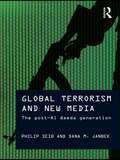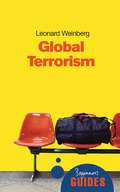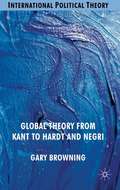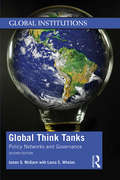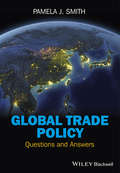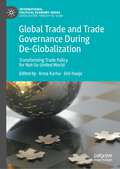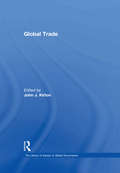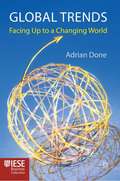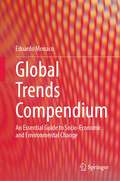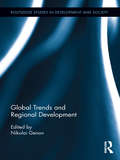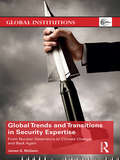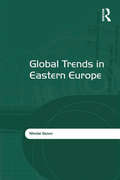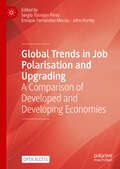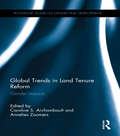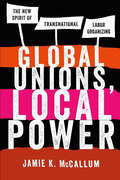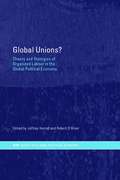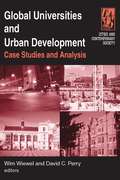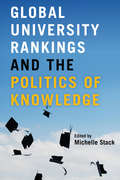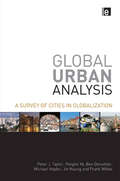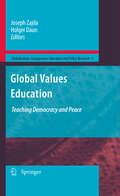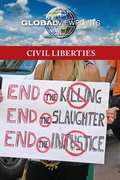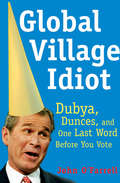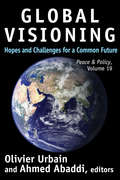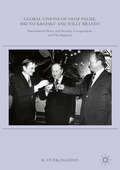- Table View
- List View
Global Terrorism and New Media: The Post-Al Qaeda Generation (Media, War and Security)
by Philip Seib Dana M. JanbekGlobal Terrorism and New Media carefully examines the content of terrorist websites and extremist television programming to provide a comprehensive look at how terrorist groups use new media today. Based partly on a content analysis of discussion boards and forums, the authors share their findings on how terrorism 1.0 is migrating to 2.0 where the interactive nature of new media is used to build virtual organization and community. Although the creative use of social networking tools such as Facebook may advance the reach of terrorist groups, the impact of their use of new media remains uncertain. The book pays particular attention to terrorist media efforts directed at women and children, which are evidence of the long-term strategy that some terrorist organizations have adopted, and the relationship between terrorists’ media presence and actual terrorist activity. This volume also looks at the future of terrorism online and analyzes lessons learned from counterterrorism strategies. This book will be of much interest to students of terrorism studies, media and communication studies, security studies and political science.
Global Terrorism: A Beginner's Guide (Beginner's Guides)
by Leonard WeinbergSince the terrible events of 9/11, more attention than ever has been paid to the threats and challenges posed by terrorists. Weinberg explains who the terrorists are, where they came from, what motivates them, and what, if anything, can be done to stop them. It provides a fascinating insight into how terrorist 'cells' operate and what they might do in the future. Leonard Weinberg is Foundation Professor of Political Science at the University of Nevada. He has also served as a consultant to the United Nations Office for the Prevention of Terrorism and was a recipient of the 1999 Thornton Peace Prize.
Global Theory from Kant to Hardt and Negri
by Gary BrowningGlobal theory represents an influential and popular means of understanding contemporary social and political phenomena. Human identity and social responsibilities are considered in a global context and in the light of a global human condition. A global perspective is assumed to be new and to supersede preceding social theory. However, if contemporary global theory is influential, its identity, assumptions and novelty are controversial. Global Theory from Kant to Hardt and Negri scrutinises global theory by examining how contemporary global theorists simultaneously draw upon and critique preceding modern theories. It re-thinks contemporary global ideas by relating them to the social thought of Kant, Hegel and Marx, and in so doing highlights divergent ambiguous aspects of contemporary global theories, as well as the continuing impact of the ideas of Kant, Hegel and Marx.
Global Think Tanks: Policy Networks and Governance (Global Institutions)
by James G. McGann Laura C. WhelanThis completely revised edition of Global Think Tanks: Policy Networks and Governance provides a clear description of and context for the global proliferation of think tanks. Presenting an important guide to the factors contributing this spread as well as the future of think tanks at the global, regional, and national level, the book reflects recent trends such as including globalization; digitalization; artificial intelligence; populism; and disinformation. It also includes a new chapter on shifting attitudes towards age and gender. Identifies the forces driving these phenomena by addressing some of the historical and current factors that have dominated policy debates around the world. explores the range of existing global think tanks and a representative group of global public policy networks and conducts detailed profiling of these organizations. extrapolates trends in current think tank research that provide a basis for understanding their impact on policy makers. identifies and critiques the role of global think tanks and global public policy networks in civil society and analyzes the challenges and opportunities facing them. recommends improvements to think tanks and global public policy networks so that they can continue to serve as a catalyst for civic engagement around the world. This book will be of great interest to all students of international relations and international organizations, alongside policy professionals working at think tanks around the world.
Global Trade Policy
by Pamela J. SmithUsing a unique, question-based format, Global Trade Policy offers accessible coverage of the key questions in trade and policy; it charts the changing policy landscape and evolving institutional arrangements for trade policies, examines trade theory, and provides students with an economic framework to better understand the current issues in national and international trade policy.Uses a unique, question-based format to explore the questions and current debates in international trade policy and their implicationsExplores trade theory to help guide discussions of trade policy, including traditional theories of inter-industry trade, as well as newer theories of intra-industry and intra-firm tradeExamines the national and international effects of widely used policies designed to directly and indirectly affect trade, and considers the evolving institutional arrangements for theseCharts the changing policy landscape from traditional trade policies - such as tariffs, quantitative restrictions, and export subsidies - to those including intellectual property rights, labor, the environment, and growth and development policiesCovers national as well as global perspectives and their interaction, helping to explain opposing views on trade policy and liberalizationIncludes applied exercises enabling students to explore open-ended and realistic questions of policy debate, making it ideal for classroom use; an instructor's manual and a range of other resources are available at www.wiley.com/go/globaltradepolicy
Global Trade and Trade Governance During De-Globalization: Transforming Trade Policy for Not-So-United World (International Political Economy Series)
by Anna Karhu Eini HaajaThis book takes a fresh and much needed perspective on the challenges of trade policy and explores possible futures for trade policy development. By taking the perspective of business studies, the book does not only focus on the economic, policy, or legislative perspectives, but views trade policy as a part of international business environment. The purpose of this book is to bring forward discussions on trade policy development and future development needs and offers a comprehensive read for international business researchers, practitioners and policymakers regarding the interconnections of trade policy and international business.
Global Trade: Voluntary Standards In Global Trade, Environment And Social Governance (The Library of Essays in Global Governance)
by John J. KirtonTrade has long been a core part of international relations. Bilateral, plurilateral and multilateral trade flows and agreements have arisen in many ways and in many areas over the centuries. From regional arrangements, such as the North American Free Trade Agreement, to the all-encompassing General Agreement on Tariffs and Trades and now the World Trade Organization, the system of global trade has seen struggles and successes alike. The traditional debate over liberalization and protectionism remains central today; and with ever-expanding globalization facing all states, the future of global trade seems to be no less controversial than it was centuries ago. By assembling the key scholarly works that have defined the field of global trade, this work addresses these debates and examines the past to see what the future of global trade might look like.
Global Trends
by Adrian DoneLooks at the bigger picture, and the future trends that are going to affect the global business world over the next few years. The author analyses traditional themes such as technology and sustainability but also takes into consideration the effects of developments in other areas such as health, education and demographics
Global Trends Compendium: An Essential Guide to Socio-Economic and Environmental Change
by Edoardo MonacoThis Compendium was conceived as a “pocket compass”, a practical guide that may help readers to orientate themselves while they explore global affairs and attempt to make sense of the highly interconnected, multidimensional challenges of contemporary human development. The book is intended to be an accessible, concise, yet comprehensive reference for anyone who hopes to better understand today’s world and its dramatic complexity. The aim is to highlight a relevant selection of the demographic, socio-economic, geo-political, and environmental macro-dynamics that define our time, and to explore in a practical way the indicators that can be used to monitor their evolution over time. In general, this project stems from the need to apply “systemic thinking” to the study of the world and to develop a holistic perspective that can bridge the gap that for too long has existed across academic disciplines and their respective focuses. The macro-trends featured in the book shed light, in particular, on the change that has been occurring over time in the vast Global South – a portion of the globe that accounts for over 80% of the world’s total population. The book’s ultimate – although not exclusive – target audience is undoubtedly composed of undergraduate students of subjects such as political science, international affairs, international development, human geography and the like. In addition, the Compendium may benefit professionals in both public and private organisations as well as members of the general public seeking to acquire "global development literacy" in manners that are academically sound, but also accessible and concise.
Global Trends and Regional Development (Routledge Studies in Development and Society)
by Nikolai GenovFor millennia, contact between societies was limited to trade or wars, a situation that changed profoundly with the development of global markets serving industrialization. The outcome was the emergence of one global human civilization, and one common future that will depend on the capacity of individuals and societies to manage the potentials for social development. This edited collection is dedicated to the discussion of four global trends: upgrading the rationality of organizations, individualization, the spreading of instrumental activism and universalization of value-normative systems. The mutual influence of these interrelated trends brings about both constructive and destructive effects in social life, social integration and change. Contributors examine questions such as: How do global trends pave their way in regions? What are the similarities and differences of regional development? How do agencies cope with the challenges of global trends in regional development?
Global Trends and Transitions in Security Expertise: From Nuclear Deterrence to Climate Change and Back Again (Global Institutions)
by James G. McGannThe scope of Security and International Affairs research has expanded tremendously since the end of the Cold War to include topics beyond the realm of war studies or military statecraft. The field—once devoted solely to the study of conventional military and nuclear security issues—has diversified to include foci often considered nontraditional, including peace and conflict, political, economic, environmental, and human security. In this exciting new volume, McGann has undertaken a quantitative and qualitative study of SIA think tanks, looking at global and regional trends in their research. He argues that the end of the Cold War marked a fundamental shift within the field of defense and security studies among think tanks and academics. Tracking the evolution of security as understood by researchers and policymakers is vital as the world follows the path of the Four Mores: more issues, more actors, more competition, and more conflict. As we move forward into a world of rapid change and ubiquitous uncertainty, think tanks will only become more prominent and influential. The volume concludes with an assessment of the future of Security and International Affairs studies and raises the possibility of a return to a traditional security focus driven by recent events in Europe and the Middle East. This will be an important resource for students and scholars of security studies, global governance, and think tanks.
Global Trends in Eastern Europe
by Nikolai GenovEastern Europe was once clearly defined by the centralized political and economic organization of the societies in the region. They shared the same official ideology and were members of the same alliances. After 1989, the region collapsed in an economic, political and cultural implosion. What were the moving forces of this profound change? What are its consequences? Could we try to reasonably foresee any future developments? In this thought-provoking book, Nikolai Genov presents a systematic description and explanation of Eastern European societal transformations after 1989. They are interpreted as adaptations to four global trends; upgrading the rationality of organizations; individualization; spreading of instrumental activism; and universalization of value-normative systems. Adaptations to these trends have generally been successful. However, Genov notes that the process is marked by many failures as well. They are mostly caused by path dependency in the societal development and by the varying quality of relevant decisions, other destructive developments are due to contradictions in the global trends themselves. Guided by the assumption that the societal and supranational integration mechanisms in Eastern Europe before 1989 could not resist the overwhelming power of global trends, Genov's controversial findings question visions about the end of history and simultaneously strengthen the confidence that most complex macro-social processes can be rationally managed. A timely book allowing for a much needed engagement in contemporary debates on the controversial processes in Eastern European transitions.
Global Trends in Job Polarisation and Upgrading: A Comparison of Developed and Developing Economies
by Enrique Fernández-Macías John Hurley Sergio Torrejón PérezThis open-access book offers a comparative analysis of changes in employment structures on a global scale, focusing on employment trends during the first decades of the 21st century across 17 developed and developing economies, including countries from Europe, North America, Central and Latin America, and Asia. The authors examine patterns of occupational change in all cases, with job upgrading and polarization being the most prevalent, and explore the factors driving these changes, such as technological change, the increased participation of women, the growth of service-oriented sectors, and others. Particular attention is given to the impact of the COVID-19 pandemic on employment. By applying consistent methods across all countries, the book provides a comprehensive understanding of employment dynamics and trends worldwide, representing one of the most significant efforts to produce comparative evidence on a global scale to date. As such, it will be of interest to researchers and policymakers focused on labor, inequality, and economic development.
Global Trends in Land Tenure Reform: Gender Impacts (Routledge ISS Gender, Sexuality and Development Studies)
by Caroline S. Archambault Annelies ZoomersThis book explores the gendered dimensions of recent land governance transformations across the globe in the wake of unprecedented pressures on land and natural resources. These complex contemporary forces are reconfiguring livelihoods and impacting women’s positions, their tenure security and well-being, and that of their families. Bringing together fourteen empirical community case studies from around the world, the book examines governance transformations of land and land-based resources resulting from four major processes of tenure change: commercial land based investments, the formalization of customary tenure, the privatization of communal lands, and post-conflict resettlement and redistribution reforms. Each contribution carefully analyses the gendered dimensions of these transformations, exploring both the gender impact of the land tenure reforms and the social and political economy within which these reforms materialize. The cases provide important insights for decision makers to better promote and design an effective gender lens into land tenure reforms and natural resource management policies. This book will be of great interest to researchers engaging with land and natural resource management issues from a wide variety of disciplines, including anthropology, sociology, development studies, and political science, as well as policy makers, practitioners, and activists concerned with environment, development, and social equity.
Global Unions, Local Power
by Jamie K. MccallumNews about labor unions is usually pessimistic, focusing on declining membership and failed campaigns. But there are encouraging signs that the labor movement is evolving its strategies to benefit workers in rapidly changing global economic conditions. Global Unions, Local Power tells the story of the most successful and aggressive campaign ever waged by workers across national borders. It begins in the United States in 2007 as SEIU struggled to organize private security guards at G4S, a global security services company that is the second largest employer in the world. Failing in its bid, SEIU changed course and sought allies in other countries in which G4S operated. Its efforts resulted in wage gains, benefits increases, new union formations, and an end to management reprisals in many countries throughout the Global South, though close attention is focused on developments in South Africa and India. In this book, Jamie K. McCallum looks beyond these achievements to probe the meaning of some of the less visible aspects of the campaign. Based on more than two years of fieldwork in nine countries and historical research into labor movement trends since the late 1960s, McCallum's findings reveal several paradoxes. Although global unionism is typically concerned with creating parity and universal standards across borders, local context can both undermine and empower the intentions of global actors, creating varied and uneven results. At the same time, despite being generally regarded as weaker than their European counterparts, U. S. unions are in the process of remaking the global labor movement in their own image. McCallum suggests that changes in political economy have encouraged unions to develop new ways to organize workers. He calls these "governance struggles," strategies that seek not to win worker rights but to make new rules of engagement with capital in order to establish a different terrain on which to organize.
Global Unions?: Theory and Strategies of Organized Labour in the Global Political Economy (RIPE Series in Global Political Economy)
by Jeffrey Harrod Robert O’BrienThis edited collection examines the interaction between industrial relations and international relations in the global economy. The role of trade unions has changed significantly in the era of economic globalization and this book analyzes the key developments in union strategy on a local, national, regional and global level.
Global Universities and Urban Development: Case Studies and Analysis (Cities And Contemporary Society Ser.)
by Wim Wiewel David C. PerryThe editors of "The University as Urban Developer" now extend that work's groundbreaking analysis of the university's important role in the growth and development of the American city to the global view. Linking the fields of urban development, higher education, and urban design, "Global Universities and Urban Development" covers universities and communities around the world, including Germany, Korea, Scotland, Japan, Mexico, South Africa, Finland - 13 countries in all.The book features contributions from noted urban scholars, campus planners and architects, and university administrators from all the countries represented. They provide a wide-angled perspective of the issues and practices that comprise university real estate development around the globe. A concluding chapter by the editors offers practical evaluations of the many cases and identifies best practices in the field.
Global University Rankings and the Politics of Knowledge
by Michelle StackFor many institutions, to ignore your university’s ranking is to become invisible, a risky proposition in a competitive search for funding. But rankings tell us little if anything about the education, scholarship, or engagement with communities offered by a university. Drawing on a range of research and inquiry-based methods, Global University Rankings and the Politics of Knowledge exposes how universities became servants to the education industry and its impact. Conceptually unique in its scope, Global University Rankings and the Politics of Knowledge addresses the lack of empirical research behind university and journal ranking systems. Chapters from internationally recognized scholars in decolonial studies provide readers with robust frameworks to understand the intersections of coloniality and Indigeneity and how they play out in higher education. Contributions from diverse geographical and disciplinary contexts explore the political economy of rankings within the contexts of the Global North and South, and examine alternatives to media-driven rankings. This book allows readers to consider the intersections of power and knowledge within the wider contexts of politics, culture, and the economy, to explore how assumptions about gender, social class, sexuality, and race underpin the meanings attached to rankings, and to imagine a future that confronts and challenges cognitive, environmental, and social injustice.
Global Urban Analysis: A Survey of Cities in Globalization
by Ben Derudder Frank Witlox Pengfei Ni Michael Hoyler Jin Huang Peter J TaylorGlobal Urban Analysis provides a unique insight into the contemporary world economy through a focus on cities. It is based upon a large-scale customised data collection on how leading businesses use cities across the world: as headquarter locations, for finance, for professional and creative services, for media. These data - involving up to 2000 firms and over 500 cities - provide evidence for both how the leading cities, sometimes called global cities, are coming to dominate the world economy, and how hundreds of other cities are faring in this brave new urban world. Thus can the likes of London, New York and Hong Kong be tracked as well as Manchester, Cleveland and Guangzhou, and even Plymouth, Chattanooga and Xi'an. Cities are assessed and ranked in terms of their importance for various functions such as for financial services, legal services and advertising, plus novel findings are reported for the geographical orientations of their connections. This is truly a comprehensive survey of cities in globalization covering global, world-regional, and national scales of analysis: - 4 key chapters outline the global structure of the world economy featuring the leading cities; - 9 regional chapters covering the whole world also feature the level of services provided by 'medium' cities; - 22 chapters on selected countries and sub-regions indicate global-ness and local-ness and feature an even wider range of cities. Written in an easy to understand style, this book is a must read for anybody interested in their own city in the world and how it relates to other cities.
Global Urban Justice
by Martha F. Davis Oomen, Barbara M. and Davis, Martha F. and Grigolo, Michele Barbara M. Oomen Michele GrigoloCities increasingly base their local policies on human rights. Human rights cities promise to forge new alliances between urban actors and international organizations, to enable the 'translation' of the abstract language of human rights to the local level, and to develop new practices designed to bring about global urban justice. This book brings together academics and practitioners at the forefront of human rights cities and the 'right to the city' movement to critically discuss their history and also the potential that human rights cities hold for global urban justice.
Global Values Education
by Joseph Zajda Holger DaunThis, the seventh in the 12-volume series Globalisation, Comparative Education and Policy Research, presents scholarly research on major discourses in values education globally. It is an accessible, practical yet scholarly resource that explores international concerns in the field of globalisation and comparative education. A vital sourcebook of ideas for researchers, practitioners and policy makers in values education, multiculturalism and moral education, the volume also provides a timely overview of current issues affecting values education, comparative education and education policy research in the global culture. Drawing on recent studies in the areas of globalisation, equity, social justice, and the role of the state, the book critically examines the interplay between values education, globalisation, and dominant ideologies, and reflects on its implications for policy. It goes further to explore conceptual frameworks and methodological approaches applicable in the research covering values education, globalisation, equity, and multicultural education. Individual chapters critically analyse the dominant discourses and debates pertaining to values education, multiculturalism and relevant comparative education discourses. In addition, the book evaluates the ambivalent and problematic relationship between the state, its dominant models of values education, globalisation and social change. The authors employ a number of diverse paradigms in comparative education research, ranging from critical theory to globalization. By focusing on ideology, globalisation and democracy, they attempt to examine critically both the reasons for, and the outcomes of, education reforms in the domain of values education, policy change and transformation. In doing so, they provide a more informed critique of Western-driven models of accountability, quality and school effectiveness.
Global Viewpoints: Civil Liberties
by Noel MerinoThis series provides readers with the information they need to think critically about the worldwide implications of global issues; each volume focuses on a controversial topic of worldwide importance and offers a panoramic view of opinions. This title explores free speech and freedom of expression, media freedom and freedom of the press, the right to due process, and the right to privacy; By illuminating the complexities and interrelations of the global community, this excellent resource helps students and other researchers enhance their global awareness.
Global Village Idiot: Dubya, Dunces, and One Last Word Before You Vote
by John O'FarrellWinner of the Best Columnist of the Year at the British Liars’ Awards and Britain’s finest satirist, O’Farrell takes dead aim in Global Village Idiot at cell phones, awards ceremonies, genetic sheep splicers, America’s right wing cabal of dunces, dunderheads, dimwits, and the Big D’ himself. Just when we thought the lawlessness in Iraq was over,” O’Farrell observes, even more blatant incidents of looting have begun. With handkerchiefs masking their faces, two rioters roughly the height of George Bush and Donald Rumsfeld kicked in the gates of the largest oilfield and grabbed the keys of the gasoline trucks. Yee-haw! It’s all ours! Millions of barrels of the stuff’ they laughed. Yup!’ added the leader and this mask guarantees my anonymousinity!’ So after all these years there really is such a person as the Thief of Baghdad. Except strangely his accent sounded vaguely Texan.” A writer for the groundbreaking television show Spitting Image and contributor to the screenplay for the hit movie Chicken Run, O’Farrell meticulously researched his conclusions by spending five minutes on the internet and then giving up.” And while O’Farrell’s sharpest barbs and stingers have often been written to come out of the mouths of grotesque puppets and Claymation chickens, this time around he keeps the best lines for himself: With the election of the 43rd President of the United States, the global village is complete,” O’Farrell writes. ’It has its own global village idiot.’”
Global Visioning: Hopes and Challenges for a Common Future (Peace And Policy Ser.)
by Ahmed AbaddiThis volume makes the case for global visioning: the collective process of looking at a larger picture and building common ground for the future. The contributors agree that only by such a process will people be able to address mounting problems like global warming, war, terrorism, and poverty, which threaten the Earth's population.This latest volume in the Peace & Policy series addresses three main themes. "On Spirituality and Ethics" advocates an international culture of nonviolence. "International and Transnational Relations" makes a case for global fellowship. "On Education and Culture" argues that educating children is the first step in reforming the world. The contributors seek solutions to the question of how people can start seeing issues from a global point of view, rather than from narrow national perspectives.In keeping with the global nature and scope of the world's problems, the contributions come from very diverse countries, including Japan, Morocco, South Africa, Germany, Italy, Belgium, and the United States. This work will inspire participation in this much-needed exercise of collective global problem solving.
Global Visions of Olof Palme, Bruno Kreisky and Willy Brandt
by B. VivekanandanThis book analyses the global visions of Olof Palme, Bruno Kreisky and Willy Brandt, European social democratic statesmen who earned international esteem for their contributions to global developments during the second half of the twentieth century. Their visions encompassed, inter alia, international peace and security, East-West and North- South Cooperation, and other important domains pertinent to developing countries of Asia, Africa and Latin America. In this volume, the author closely examines the advancements Palme, Kreisky and Brandt made and demonstrates how their visions remain valid for shaping the future of mankind.
